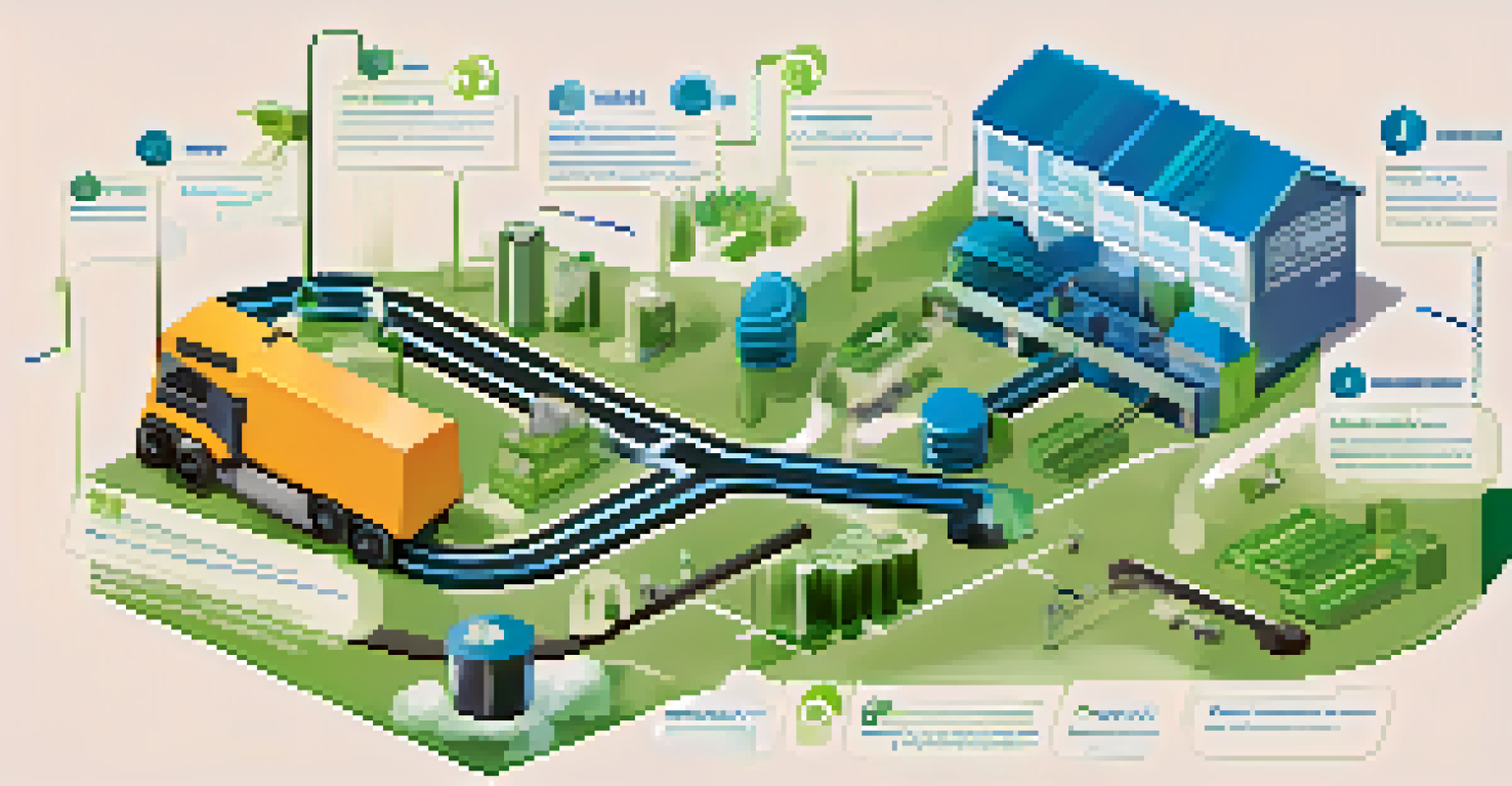The Importance of Transparency in Supply Chain Ethics

Understanding Supply Chain Transparency and Its Importance
Supply chain transparency refers to the clarity and openness of the processes involved in the production and distribution of goods. It allows stakeholders, from consumers to regulators, to trace the journey of a product from raw materials to finished items. This transparency is crucial because it builds trust and accountability among all parties involved.
Transparency is the key to trust, and trust is the key to loyalty.
When companies are transparent about their supply chains, they can showcase their commitment to ethical practices. For example, a clothing brand that reveals the factories it uses can foster consumer confidence and loyalty. People are more likely to support brands that they believe are doing the right thing.
Moreover, transparency helps in identifying and addressing issues like labor exploitation or environmental concerns. In a world increasingly focused on sustainability, being open about supply chain practices can also provide a competitive advantage.
Building Consumer Trust Through Transparency
In today’s market, consumers are more conscious than ever about where their products come from. They want to know the story behind their purchases, and transparency plays a key role in sharing that narrative. Brands that openly communicate their supply chain practices often find that consumers are more willing to buy their products.

For instance, a company that shares details about sourcing organic materials can appeal to eco-conscious buyers. This not only enhances brand loyalty but also encourages consumers to advocate for the brand within their circles, creating a ripple effect of trust and credibility.
Supply Chain Transparency Builds Trust
Open supply chains foster consumer confidence and loyalty by showcasing a brand's commitment to ethical practices.
Ultimately, transparency in supply chains can lead to a more informed consumer base. When customers make purchases based on ethical considerations, they feel empowered, thus driving brands to maintain high standards.
Ethical Responsibility and Corporate Accountability
Transparency in supply chain ethics is closely tied to corporate responsibility. Businesses have an ethical obligation to ensure that their operations do not harm people or the planet. By being transparent, companies can hold themselves accountable for their impact on society.
In a world where consumers are increasingly aware of their choices, transparency in supply chains is not just a preference but a necessity.
For example, if a food company is open about its sourcing practices, it can take proactive steps to ensure fair wages for farmers and sustainable farming methods. This not only benefits the communities involved but also enhances the company’s reputation.
Moreover, when companies face scrutiny, transparency acts as a shield. By openly sharing information, they can mitigate negative perceptions and build a reputation for integrity.
The Role of Technology in Enhancing Transparency
Advancements in technology have paved the way for greater supply chain transparency. Tools like blockchain allow companies to track products in real-time, ensuring that every step from production to delivery is documented. This level of detail helps build trust among consumers and partners.
For instance, a food retailer using blockchain can provide customers with details about the origin of their produce, including how it was grown and the journey it took to reach the shelf. This not only satisfies consumer curiosity but also demonstrates a commitment to quality and safety.
Technology Enhances Transparency Efforts
Advancements like blockchain enable companies to track products in real-time, ensuring accountability and trust.
Furthermore, technology can facilitate better communication between supply chain partners. This interconnectedness ensures that all parties adhere to ethical standards, reducing the risk of malpractices.
Regulatory Pressures and Industry Standards
Governments and regulatory bodies are increasingly emphasizing transparency in supply chains. Legislation often mandates disclosures related to labor practices, environmental impact, and sourcing methods. Companies that prioritize transparency can navigate these regulations more smoothly and avoid potential penalties.
For example, in some regions, laws require companies to disclose their carbon footprint and labor practices. Those who are prepared with transparent operations can easily comply, while others may struggle to catch up.
This regulatory environment not only pushes companies toward ethical practices but also levels the playing field. As transparency becomes the norm, businesses that fail to comply risk losing their competitive edge.
Challenges to Achieving Supply Chain Transparency
While transparency is essential, it’s not without challenges. One of the biggest hurdles is the complexity of global supply chains. With multiple suppliers and processes involved, gathering and sharing information can be daunting.
Moreover, some companies fear that revealing too much about their supply chains could expose them to competition or negative scrutiny. This hesitation can lead to a lack of transparency, ultimately harming their brand image.
Regulations Push for Ethical Practices
Increasing government mandates on supply chain transparency encourage businesses to adopt ethical sourcing and labor practices.
To counter these challenges, businesses need to foster a culture of openness and collaboration. By investing in training and technology, they can streamline their processes and embrace transparency as a core value.
The Future of Ethical Supply Chains
Looking ahead, the importance of transparency in supply chain ethics will only grow. As consumers become more aware and concerned about ethical sourcing, companies will need to prioritize transparency to stay relevant. This shift is likely to drive innovation and improvements across industries.
For instance, brands that embrace transparency may begin to adopt circular economy practices, where products are designed for reuse and recycling. This not only benefits the environment but also aligns with consumer values.

Ultimately, a transparent approach to supply chains can lead to a more sustainable future for both businesses and the communities they serve. By committing to ethical practices, companies can help shape a better world.